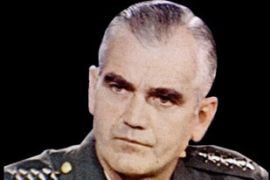Analysis: Repeating history?
The Petraeus testimony underlines the similarities between Iraq and Vietnam.

He claimed the enemy (the Viet Cong and North Vietnamese Army) were a defeated force and could no longer mount a credible offence on the battlefield.
It was the first time a battle commander had addressed congress during a war, and to thunderous applause he proclaimed: “We will prevail in Vietnam over the communist aggressor.”
He later said they were “winning a war of attrition”, forecast that “mopping up the enemy” would take around two years and that the war had reached a stage “where the end comes into view”.
All of these messages were politically crafted, designed to gain support for the war in the minds of the American people, although in his case, he was relating a genuine improvement in American fortunes.
Which made the shock of the Tet offensive in January 1968 all the greater as more than 100 cities were attacked, including assaults on General Westmoreland’s headquarters and the US embassy in Saigon, which was occupied for a few hours.
A few months later he was asking for more troops, the US continued to suffer heavy casualties until a ceasefire was negotiated in 1973.
General Petraeus is delivering a similar message, saying the so-called “surge” has helped improve security in Baghdad and reduced fighting in al-Anbar province, and that American troops are integrating into neighbourhoods instead of patrolling in armoured vehicles.
While he concedes there has been less political progress during the surge, he remains optimistic and argues Iraq’s political leaders should be given more time and that the US should “stay the course”.
Calls to stay the course in Iraq are “the same kind of thinking, actually, that got us mired in Vietnam,” said John Kerry, the Democrat senator on ABC television, adding that the mission was “disastrous”.
What remains to be seen is whether General Petraeus will suffer the same fate as his predecessor.
Libel action
After the shock counter-attack of the Tet offensive, Johnson limited further increases in troops, while Westmoreland himself was promoted to US army chief of staff, but as his request for 200,000 more troops had been rejected his position effectively became untenable and he retired in 1972.
The general later said: “It’s not that we lost the war militarily. The fact is that we as a nation did not make good our commitment to the South Vietnamese.”
Ten years later he brought a $120m lawsuit against CBS television over a documentary which implied he had deceived President Johnson – and by definition, the American public – about the strength of the enemy troops in Vietnam.
After a four-month-long hearing, the case was settled just as it was due to go to the jury and Westmoreland accepted an apology from the broadcaster.
“I have no apologies, no regrets. I’ve been hung in effigy. I’ve been spat upon. You just have to let those things bounce off,” he told AP news agency in 1985.
General Westmoreland died in 2005, aged 91.
